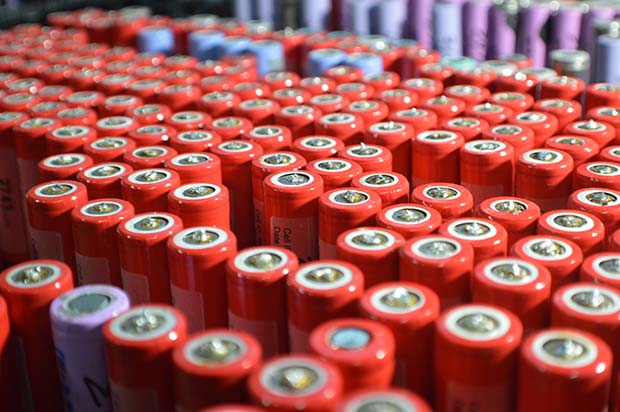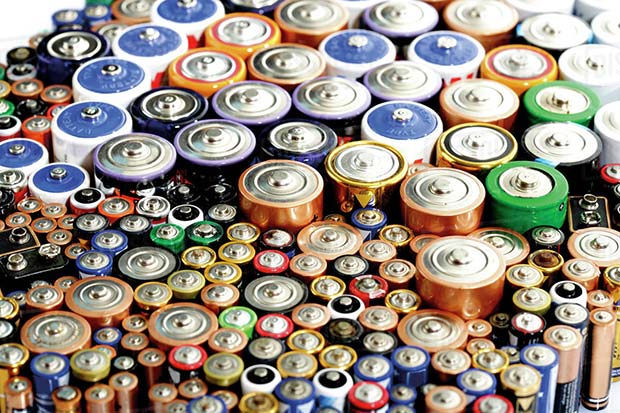Batteries Not Included is possibly the most dreaded toy label for a parent to discover on Christmas Day, yet many shoppers fail to stock up on these festive essentials until the very last minute, some forget to buy any altogether and others fail to pick the right battery for their device.
 VARTA is colour coding its packaging and using device icons to inform a shopper’s choice. Consumers can choose from a range of optimal energy solutions for devices, from toys to cameras to remote controls and more.
VARTA is colour coding its packaging and using device icons to inform a shopper’s choice. Consumers can choose from a range of optimal energy solutions for devices, from toys to cameras to remote controls and more.
Toys in particular are high-drain devices and get through batteries quickly, and so the batteries most suited to power medium-drain devices, such as fairy lights, or low drain devices, such as remote controls, will not last as long if used to power the most powerful devices on this Christmas’ top toys list.
However, with 62% of parents forgetting to buy batteries when needed and research showing that batteries are the single-most forgotten item on the festive shopping list, most shoppers end up buying the wrong battery product to power their newly acquired devices.
VARTA’S Longlife Power and Longlife Max Power batteries are best suited to power hungry devices, such as battery-operated toys.
Many people don’t know that buying the correct type of batteries for your device can increase the performance of the battery, which can lead to purchasing batteries being an expensive habit, especially for parents.
According to data from Statista, the average UK household buys 30 batteries every Christmas, and according to sales data from VARTA this peaks as late as 24 December. Kantar data from December 2019 shows that more shoppers buy batteries in the 12 weeks of Christmas, with panicked shoppers making ill-informed last-minute purchases.
To recharge shoppers’ knowledge of the different power options available to charge this Christmas’ gifts, VARTA has launched a national THINK SMARTER CHOOSE VARTA digital marketing campaign, encouraging consumers to buy the best type of battery for their device and therefore save money.
Mona Chan, Marketing Manager at VARTA, comments: “Our festive marketing campaign aims to educate shoppers that not all batteries are created equal. It focuses on the key benefits of VARTA products, helping customers to make an informed choice on the best battery for their device, ensuring the battery performs better and longer to save the customer both money and time, as well as helping the environment by reducing unnecessary waste.”
 VARTA’s findings reveal that nearly half of the toys it surveyed require batteries and then that half of those do not include any batteries in their packaging, despite some requiring up to 14 batteries (The Laser Battle Hunters Vehicle Set), and 30% of the toys across the lists require five batteries or more. On average, four batteries are needed per battery-operated toy featured, meaning that parents in an average 2.4 child UK household will need to buy 24 batteries to power all the new toys received on Christmas Day.
VARTA’s findings reveal that nearly half of the toys it surveyed require batteries and then that half of those do not include any batteries in their packaging, despite some requiring up to 14 batteries (The Laser Battle Hunters Vehicle Set), and 30% of the toys across the lists require five batteries or more. On average, four batteries are needed per battery-operated toy featured, meaning that parents in an average 2.4 child UK household will need to buy 24 batteries to power all the new toys received on Christmas Day.
Chan adds: “With the average UK household needing to purchase 24 additional batteries this Christmas we are urging retailers not to fall at the final hurdle and to stock up on batteries for the festive season.”
Vicky Raman, Brand Marketing Manager, Panasonic Energy Europe, comments: “One trend is consumers increasingly seek value for money. In the battery category, this leads to people looking for larger pack sizes. As for products, we see sales for Alkaline batteries rising consistently (+4%) as well as a strong growth for Lithium button cells (+3%).”
In retail, Panasonic’s best sellers are the Alkaline value-for-money ranges: Alkaline Power and Everyday Power. Next is the high-performance range EVOLTA.
Panasonic is launching larger battery pack sizes, in response to consumers’ demand for better value for money and economy packs. Retailers will also see new displays for their stores.
From January to June 2020, the total value for battery sales in the UK grew + 3%. The Covid-19 pandemic certainly played a role in this, with people staying at home and using more electronic devices.
While battery prices rose + 2% on average, Panasonic decreased prices – 2%. As a result, its value sales rose + 14%.
“I advise retailers to stay ahead of sales, by making sure your batteries range is fully available at any time,” says Raman. “Stock up on the best sellers, maximise visibility and be rigorous with merchandising. Get your offer right at key moments in the year, like the summer holidays or Christmas.”
Panasonic has teamed up with Hasbro’s Power Rangers in a Europewide campaign, including Special Edition Power Rangers Battery Packs and an online competition. Each month offers a new chance to win Power Rangers prizes and Panasonic batteries, the first prize being a trip to the Power Rangers TV set.
Consumers can enter at poweryourday.win. Special edition battery packs, including the competition website, will be appearing in stores.
In addition to the Power Rangers partnership, there’s new displays and clip strips themed according to activities or to key times of the year, and attractive consumer packs.
Panasonic works with retailers to maximise sales through the channel by offering attractive consumer packs, displays and POS merchandising.
“The battery market hasn’t suffered from the Covid-19 crisis,” adds Raman. “At the start of the lockdown, we saw people all around the world stockpiling essentials like toilet paper, flour and also batteries.”
Then during the lockdown, people spent a lot of time in their homes and therefore increasingly engaged in activities like gaming, watching TV and cooking. These all require battery use, so again we saw an increase in sales.
“The way people shop changed somewhat too: trips to the shop became less frequent during the lockdown, which resulted in higher spending per trip. There was more local shopping too – especially interesting for the grocery industry – and more online sales,” concludes Raman.
Luke Anderson, Duracell Marketing Manager UK & IRE, comments: “Just as with many household items, we have seen the ‘stockpiling’ trend pick up in the battery market. Given batteries is a category with wide reaching distribution and the largest grocers remained open throughout the pandemic, sales of batteries have been at record highs.”
Duracell have been researching both shopping and consumption habits throughout the pandemic to better understand how the changes in our behaviour have changed the category.
The study has included the UK, and questions 3,000 UK panellists every 2 weeks since lockdown began in March.
What Duracell has learned is that our mobility is very much linked to the devices that consume batteries, and that during the strictest of lockdown, wireless game controllers, TV remotes, kitchen scales and motorized toys all experienced extremely high consumption.
Conversely, those devices linked to mobility dropped, e.g. garage door controllers, camping and biking accessories.
“Consumers report that they have been buying more batteries, however what they are buying they are consuming as in-home stocks do not increase,” says Anderson. “This is good news for the category as we enter the key period for batteries at Christmas.”
The best-selling products for Duracell are currently the Duracell core range – Duracell Plus AA and AAA 4 pack lead followed by Duracell Plus 9V1, C2, DC and 2032.
The new Duracell Powerbank 1.5 is being released this year, charging up to two devices simultaneously at 18 watts at three times faster speed than charging at the wall.
“Duracell has an always on 2020 H2 ATL media approach that all retailers including convenience will benefit from as our brand will retain strong top of mind awareness and unaided awareness as the customer brand of choice,” Anderson enthuses.
“Q4 2020 is a consistently busy period of high battery consumption and it is likely this year will see even higher given the inclusion of console launches around the same time, as well as purchasing home entertainment and toys for games – it is crucial to not forget the batteries!”
Duracell is ready stocked to supply for Q4 and to ensure no retailers are left without the batteries this Christmas.
“We also pride ourselves in the child safety of our speciality products,” Anderson continues. “For instance, did you know that hundreds of cases of battery ingestions are reported each year?”
More than 90% of accidents occur due to lithium coin removed from devices or loose lithium coin. If left untreated, an ingested lithium coin cell is difficult to detect and can have serious consequences. Duracell’s speciality batteries include more child safety features such as baby secure technology and tamper-proof packaging.
“As consumption of AA and AAA batteries increases, the retailers should focus on access to these as their core range,” advises Anderson. “We also found from Duracell research that price has not been a key factor in the category, as consumers bought more of the premium brand such as Duracell in the category than any other over the past months, and also bought into bigger packs, with 12 packs having their highest sales in any first half of the calendar year on record. Taking this into account, retailers should consider battery packet sizes as well as battery types.”
The battery category acts as an opportunity to increase in basket spend whilst also driving up profit per customer sale in that the profit margin from a battery sale tends to be higher than other products. In comparison to other available convenience products batteries can be seen as a high value items with high margin providing great cash profit opportunity requiring a relatively small merchandising area, ideally at checkout to maximize sales potential.
The private label batteries had strong sales in the Coronavirus crisis, up +12% in value sales in the last 26 weeks according to IRI. All grocers experienced uplifts to varying degrees.
We have also seen changes across battery type growth. Over the last few years, the strongest growth has come from Lithium Coins as devices get smaller and more powerful. However, during the pandemic, traditional Alkaline batteries have had the strongest growth as they are the most used in our households.
Devices that are consuming AA and AAA batteries had the highest consumption. This is not surprising given consumers have had to adapt to staying in more. Due to the lockdown Powerbanks have been used less in more recent months as Brits spend less time on-the-go themselves, whilst TV remotes have most likely never been used to such a high extent, likewise battery-powered toys have been crucial in keeping kids entertained whilst families have juggled work and childcare at home.




Comments are closed.